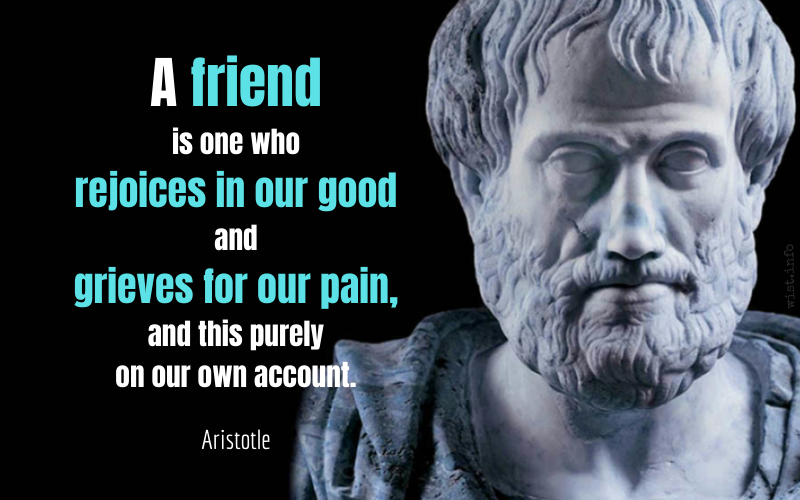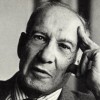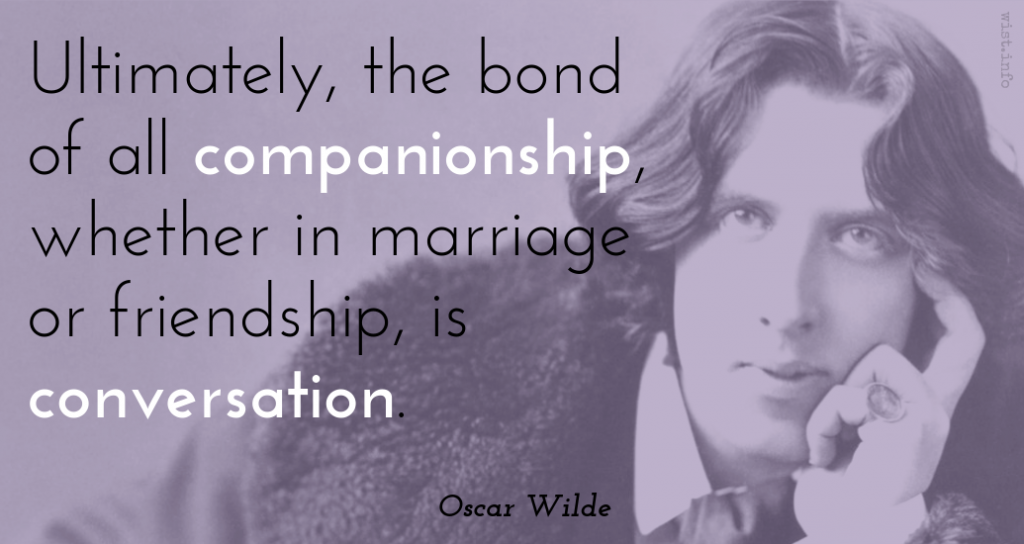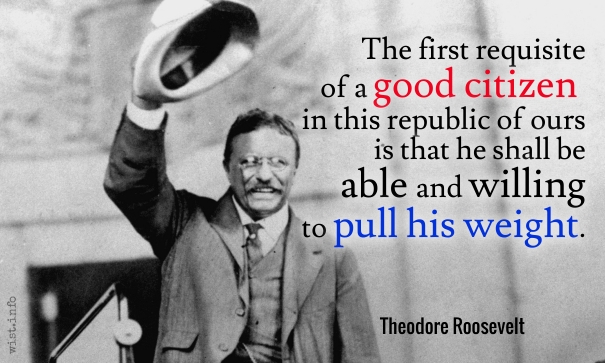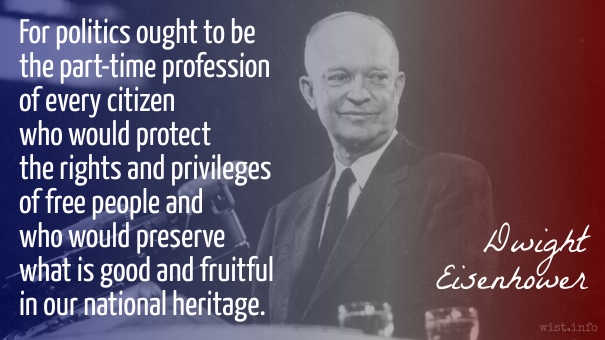Every human interaction offers you the chance to make things better or to make things worse.
Barbara Brown Taylor (b. 1951) American minister, academic, author
An Altar in the World, ch. 8 (2009)
(Source)
Quotations about:
engagement
Note not all quotations have been tagged, so Search may find additional quotes on this topic.
Not in some cloister or cave,
Not in some kingdom above,
Here, on this side of the grave,
Here, should we labor and love.Ella Wheeler Wilcox (1850-1919) American author and poet.
“Here and Now.” st. 4, Custer and Other Poems (1896)
(Source)
Closing lines.
Do what you love. Know your own bone; gnaw at it, bury it, unearth it, and gnaw it still. Do not be too moral. You may cheat yourself out of much life so. Aim above morality. Be not simply good, be good for something.
Henry David Thoreau (1817-1862) American philosopher and writer
Letter (1848-03-27) to Harrison Blake
(Source)
Collected in F. B. Sanborn, ed., Familiar Letters (1865),
Dean Swift’s rule is as good for women as for men — never to talk above a half minute without pausing, and giving others an opportunity to strike in.
Only if a child feels right can he think right.
Haim Ginott (1922-1973) Israeli-American school teacher, child psychologist, psychotherapist [b. Haim Ginzburg]
Teacher and Child, ch. 4 “Congruent Communication” (1972)
(Source)
Just as eating contrary to the inclination is injurious to the health, study without desire spoils the memory, and it retains nothing that it takes in.
Leonardo da Vinci (1452-1519) Italian artist, engineer, scientist, polymath
MS. 2038, Bib. Nat. 34 r. [tr. McCurdy (1908)]
(Source)
I have always thought that all the theories of what a good play is, or how a good play should be written, are futile. A good play is a play which, when acted upon the boards, makes an audience interested and pleased. A play that fails in this is a bad play.
Maurice Baring (1874-1945) English man of letters, writer, essayist, translator
Have You Anything to Declare? (1936)
(Source)
The true spirit of conversation consists in building on another man’s observation, not overturning it.
Edward George Bulwer-Lytton (1803-1873) English novelist and politician
The Student, Vol. 2, “The New Phaedo,” Conversation 1 (1835)
(Source)
See La Bruyere.
Legitimacy is based on three things. First of all, the people who are asked to obey authority have to feel like they have a voice — that if they speak up, they will be heard. Second, the law has to be predictable. There has to be a reasonable expectation that the rules tomorrow are going to be roughly the same as the rules today. And third, the authority has to be fair. It can’t treat one group differently from another.
Malcolm Gladwell (b. 1963) Anglo-Canadian journalist, author, public speaker
David and Goliath: Underdogs, Misfits, and the Art of Battling Giants (2013)
(Source)
Hard work is a prison sentence only if it does not have meaning. Once it does, it becomes the kind of thing that makes you grab your wife around the waist and dance a jig.
Malcolm Gladwell (b. 1963) Anglo-Canadian journalist, author, public speaker
Outliers: The Story of Success, Part 1, ch. 5, sec. 10 (2008)
(Source)
Good writing does not succeed or fail on the strength of its ability to persuade. It succeeds or fails on the strength of its ability to engage you, to make you think, to give you a glimpse into someone else’s head — even if in the end you conclude that someone else’s head is not a place you’re really like to be.
It is written that the last enemy to be vanquished is death. We should begin early in life to vanquish this enemy by obliterating every trace of the fear of death from our minds. Then can we turn to life and fill the whole horizon of our souls with it, turn with added zest to all the serious tasks which it imposes and to the pure delights which here and there it affords.
Felix Adler (1851-1933) German-American educator
Life and Destiny, Lecture 8 “Suffering and Consolation” (1903)
(Source)
The only way to make sense out of change is to plunge into it, move with it, and join the dance.
Alan Watts (1915-1973) Anglo-American philosopher, writer
The Wisdom of Insecurity: A Message for an Age of Anxiety, ch. 3 (1951)
(Source)
The reason some parents really enjoy their children is that they take the time to live with them.
Marcelene Cox (1900-1998) American writer, columnist, aphorist
“Ask Any Woman” column, Ladies’ Home Journal (1946-04)
(Source)
Neither should one live in the past, as if to him there was no future; as if he had done with all the rest of life. Keep young. Many men talk about being born again. Every man should be born again on the first day of January. Start with a fresh page. Take up one more hole in the buckle, if necessary, or let down one, according to circumstances; but, on the first of January let every man gird himself once more, with his face to the front, and take interest in the things that are and are to be, and not in the things that were and are past.
I am not concerned that other people do not understand me. I worry that I do not understand other people.
[不患人之不己知、患不知人也]
Confucius (c. 551- c. 479 BC) Chinese philosopher, sage, politician [孔夫子 (Kǒng Fūzǐ, K'ung Fu-tzu, K'ung Fu Tse), 孔子 (Kǒngzǐ, Chungni), 孔丘 (Kǒng Qiū, K'ung Ch'iu)]
The Analects [論語, 论语, Lúnyǔ], Book 1, verse 16 (1.16) (6th C. BC – AD 3rd C.) [tr. Li (2020)]
(Source)
(Source (Chinese)). See also 4.14, 14.30, 15.19. Alternate translations:I will not be afflicted at men's not knowing me; I will be afflicted that I do not know men.
[tr. Legge (1861)]It does not greatly concern me that men do not know me; my great concern is, my not knowing them.
[tr. Jennings (1895)]One should not be concerned not to be understood of men; one should be concerned not to understand men.
[tr. Ku Hung-Ming (1898)]I will not grieve that men do not know me; I will grieve that I do not know men.
[tr. Soothill (1910)]Not worried that men do not know me, but that I do not understand men.
[tr. Pound (1933)][The good man] does not grieve that other people do not recognize his merits. His only anxiety is lest he should fail to recognize theirs.
[tr. Waley (1938)]I am not concerned that people do not know of me; I am concerned that I do not know of them.
[tr. Ware (1950)]It is not the failure of others to appreciate your abilities that should trouble you, but rather your failure to appreciate theirs.
[tr. Lau (1979)]One does not worry about the fact that other people do not appreciate one. One worries about not appreciating other people.
[tr. Dawson (1993)]Don't worry if people don't recognize your merits; worry that you may not recognize theirs.
[tr. Leys (1997)]Do not worry about men not knowing you; rather, worry about incapability and ignorance.
[tr. Huang (1997)]Do not worry about that others do not understand me, just worry about that I do not understand others.
[tr. Cai/Yu (1998)]Don't worry about not being acknowledged by others; worry about failing to acknowledge them.
[tr. Ames/Rosemont (1998)]He does not worry that others do not know him; he worries that he does not know others.
[tr. Brooks/Brooks (1998)]Don't grieve when people fail to recognize your ability. Grieve when you fail to recognize theirs.
[tr. Hinton (1998)]Do not be concerned about whether or not others know you; be concerned about whether or not you know others.
[tr. Slingerland (2003)]Don’t worry about whether other people understand you. Worry about whether you understand other people.
[tr. Watson (2007)]Do not worry that other people do not know you. But be concerned that you do not know them.
[tr. Annping Chin (2014)]
The love of our neighbor in all its fullness simply means being able to say to him: “What are you going through?” It is a recognition that the sufferer exists, not only as a unit in a collection, or a specimen from the social category labelled “unfortunate,” but as a man, exactly as we are, who was one day stamped with a special mark by affliction.
Simone Weil (1909-1943) French philosopher
“Studies with a View to the Love of God” (Apr 1942), Waiting for God [Awaiting God; Attente De Dieu] (1950)
(Source)
The biggest threat to our democracy is indifference. The biggest threat to our democracy is cynicism — a cynicism that’s led too many people to turn away from politics and stay home on election day. […] So if you don’t like what’s going on right now — and you shouldn’t — do not complain. Don’t hashtag. Don’t get anxious. Don’t retreat. Don’t binge on whatever it is you’re bingeing on. Don’t lose yourself in ironic detachment. Don’t put your head in the sand. Don’t boo. Vote. You’ve got to vote.
Barack Obama (b. 1961) American politician, US President (2009-2017)
Speech, University of Illinois (7 Sep 2018)
(Source)
Not to talk with people although they can be talked with is to waste people. To talk with people although they can’t be talked with is to waste words. A man of understanding does not waste people, but he also does not waste words.
[子曰、可與言、而不與之言、失人、不可與言、而與之言、失言、知者不失人、亦不失言。]
Confucius (c. 551- c. 479 BC) Chinese philosopher, sage, politician [孔夫子 (Kǒng Fūzǐ, K'ung Fu-tzu, K'ung Fu Tse), 孔子 (Kǒngzǐ, Chungni), 孔丘 (Kǒng Qiū, K'ung Ch'iu)]
The Analects [論語, 论语, Lúnyǔ], Book 15, verse 8 (15.8) (6th C. BC – 3rd C. AD) [tr. Dawson (1993)]
(Source)
(Source (Chinese)). Older translations use Legge's original verse divisions and numbering (15.7).
The passage contains a native pun, combining both noun and verb senses of yén [言] (talk), which is difficult to translate into English (leading to blends of "speak" and "talk" and "words"). Alternate translations:When a man may be spoken with, not to speak to him is to err in reference to the man. When a man may not be spoken with, to speak to him is to err in reference to our words. The wise err neither in regard to their man nor to their words.
[tr. Legge (1861), 15.7]Not to speak to a man to whom you ought to speak, is to lose your man; to speak to one to whom you ought not to speak is to lose your words. those who are wise will not lose their man, nor yet their words.
[tr. Jennings (1895), 15.7]When you meet the proper person to speak to and do not speak out, you lose your opportunity; but when you meet one who is not a proper person to speak to and you speak to him, you waste your words. A man of intelligence never loses his opportunity, neither does he waste his words.
[tr. Ku Hung-Ming (1898), 15.7]Not to enlighten one who can be enlightened is to waste a man; to enlighten one who cannot be enlightened is to waste words. The intelligent man neither wastes his man nor his words.
[tr. Soothill (1910), 15.7]When you should talk to a man, and don’t, you lose the man; when it’s no use talking to a man, and you talk to him, you waste words. An intelligent man wastes (loses) neither men nor words.
[tr. Pound (1933), 15.7]Not to talk to one who could be talked to, is to waste a man. To talk to those who cannot be talked to, is to waste one's words. He who is truly wise never wastes a man; but on the other hand, he never wastes his words.
[tr. Waley (1938), 15.7]If we fail to speak with a man who can be spoken with, we lose a man. If we do speak with a man who cannot be spoken with, our words go for nought. The wise lose neither man nor words.
[tr. Ware (1950), 15.8]When you find a person worthy to talk to and fail to talk to him, you have lost your man. When you find a man unworthy to talk to and you talk to him, you have lost (i.e., wasted) your words. A wise man neither loses his man, nor loses his words.
[tr. Lin Yutang (1938)]To fail to speak to a man who is capable of benefiting is to let a man go to waste. To speak to a man who is incapable of benefiting is to let one's words go to waste. A wise man lets neither men nor words go to waste.
[tr. Lau (1979), 15.8]When dealing with a man who is capable of understanding your teaching, if you do not teach him, you waste the man. When dealing with a man who is incapable of understanding your teaching, if you do teach him, you waste your teaching. A wise teacher wastes no man and wastes no teaching.
[tr. Leys (1997), 15.8]If a man is worth talking to and you do not talk to him, you lose a man; if a man is not worth talking to and you talk to him, you lose your words. The man of wisdom neither loses a man nor loses his words.
[tr. Huang (1997), 15.8]When you should talk with one, you do not talk with one, it means to lose the people. When you should not talk with one, you talk with one, it means to lose the word. A wise person does not lose the people, and does not lose the word too.
[tr. Cai/Yu (1998), 15.8 / #392]To fail to speak to someone who can be engaged is to let that person go to waste; to speak to someone who cannot be engaged is to waste your words. The wise [zhi] do not let people go to waste, but they do not waste their words, either.
[tr. Ames/Rosemont (1998), 15.8]If he can be talked to and you do not talk to him, you waste the man. If he cannot be talked to and you talk to him, you waste your talk. The knowledgeable will not waste a man, but will also not waste his talk.
[tr. Brooks/Brooks (1998), 15.8]When a person is capable of understanding your words, and you refuse to speak, you're wasting a person. When a person isn't capable of understanding your words, and you speak anyway, you're wasting words. The wise waste neither words nor people.
[tr. Hinton (1998), 15.8]If it's someone you ought to speak to and you fail to speak, you waste a person. If it's someone you ought not to speak to and you speak, you waste words. The wise man doesn't waste people and doesn't waste words, either.
[tr. Watson (2007), 15.8]Not to speak to a man who is capable of absorbing what you say is to let the man go to waste. To speak to a man who is incapable of absorbing what you say is to let your words go to waste. A person of wisdom does not let either men or words go to waste.
[tr. Annping Chin (2014), 15.8]When it is appropriate and feasible to speak [and give advice] to a person, but you refrain from doing so, you will lose a friend. When it is inappropriate or infeasible to speak to a person, but you speak anyhow, you misspeak.
[tr. Li (2020), 15.8]
It is compassion rather than the principle of justice which can guard us against being unjust to our fellow men.
Eric Hoffer (1902-1983) American writer, philosopher, longshoreman
The Passionate State of Mind, Aphorism 140 (1955)
(Source)
It falls to each of us to be those anxious, jealous guardians of our democracy; to embrace the joyous task we’ve been given to continually try to improve this great nation of ours. Because for all our outward differences, we, in fact, all share the same proud title, the most important office in a democracy: Citizen. Citizen. So, you see, that’s what our democracy demands. It needs you. Not just when there’s an election, not just when your own narrow interest is at stake, but over the full span of a lifetime.
Barack Obama (b. 1961) American politician, US President (2009-2017)
“Farewell Address,” Chicago (10 Jan 2017)
(Source)
Our democracy is threatened whenever we take it for granted. All of us, regardless of party, should be throwing ourselves into the task of rebuilding our democratic institutions. When voting rates in America are some of the lowest among advanced democracies, we should be making it easier, not harder, to vote. When trust in our institutions is low, we should reduce the corrosive influence of money in our politics, and insist on the principles of transparency and ethics in public service. When Congress is dysfunctional, we should draw our congressional districts to encourage politicians to cater to common sense and not rigid extremes. But remember, none of this happens on its own. All of this depends on our participation; on each of us accepting the responsibility of citizenship, regardless of which way the pendulum of power happens to be swinging.
Barack Obama (b. 1961) American politician, US President (2009-2017)
“Farewell Address,” Chicago (10 Jan 2017)
(Source)
Democratic citizenship requires a degree of empathy, insight, and kindness that demands a great deal of all of us. There are easier ways to live.
Jason Stanley (b. 1969) American philosopher, epistemologist, academic
How Fascism Works: The Politics of Us and Them, ch. 10 (2018)
(Source)
I note in a letter forwarded to me by the Famous Writers School that I have “aided the Communist conspiracy.” If this is indeed true, and I mean this with sincerity and respect, I should turn myself in to any local F.B.I. office. It was not my intention to aid and conspire, when I wrote the TV script, “Carol for Another Christmas,” nor was I remotely interested in propagandizing for the United Nations or for any organization. I was deeply interested in conveying what is a deeply felt conviction of my own. This is simply to suggest that human beings must involve themselves in the anguish of other human beings. This, I submit to you, is not a political thesis at all. It is simply an expression of what I would hope might be ultimately a simple humanity for humanity’s sake.
Rod Serling (1924-1975) American screenwriter, playwright, television producer, narrator
Letter to viewer who complained about the TV movie “Carol for Another Christmas” (1964)
(Source)
Quoted in Anne Serling, As I Knew Him: My Dad, Rod Serling (2013).
Me kindly Rome loves, quotes my books, and buys them;
But till that critic feigning to despise them
Blushed and turned pale, then yawned and looked confounded,
I never felt my fame was surely grounded.[Laudat, amat, cantat nostros mea Roma libellos,
Meque sinus omnes, me manus omnis habet.
Ecce rubet quidam, pallet, stupet, oscitat, odit.
Hoc volo: nunc nobis carmina nostra placent.]Martial (AD c.39-c.103) Spanish Roman poet, satirist, epigrammatist [Marcus Valerius Martialis]
Epigrams [Epigrammata], Book 6, epigram 60 (6.60) (AD 91) [tr. Pott & Wright (1921)]
(Source)
(Source (Latin)). Alternate translations:Rome lauds, & loves, & reades my works,
and singes them every where:
Each fist doth hld me clutched fast,
eache bosome me doth beare.
One bluseth lo, as red as fyre,
anone as pale as claye:
Anone he looks astonished,
as one did hym dismaye:
Sometime he mumping mockes and moes,
sometime he doth repine:
Ymarrie, this is that I would:
now please me verses mine.
[tr. Kendall (1577)]Rome hugs my verse, and cries up for rare,
My books each hand and ev'ry bosom bear;
There's one yet lowers, disdains, is ill at ease:
I'm glad; my verses now myself do please.
[tr. Killigrew (1695)]The town beloves, applauds, attunes my strains;
Each hand engrasps them, and each bosom gains:
See one change color, grin, and gape with hate!
This crowns my wish: be this my Muse's fate.
[tr. Elphinston (1782)], Book 2, ep. 16]Rome, city of my affections, praises, loves, and recites my compositions;
I am in every lap, and in every hand.
But see, yon gentleman grows red and pale by turns, looks amazed, yawns, and, in fact, hates me.
I am delighted at the sight; my writings now please me.
[tr. Bohn's Classical (1859), ep. 61]Quite friendly, Rome applauds my lay;
dotes on it, quotes it day by day.
My verses every pocket fill,
And every hand bethumbs me still.
See, yonder man turns red and white,
Winces, and yawns disgusted quite.
This I enjoy; by this I tell
That now my verses please me well.
[tr. Webb (1879), ep. 61]My Rome praises, loves, and hums my verses,
and every pocket, every hand holds me.
See, yonder fellow turns red, turns pale, is dazed, yawns, curses! v This is what I want; now my verses please me!
[tr. Ker (1919)]All Rome extols and loves and quotes my lines
And every bosom holds them, every hand;
See one that reddens, pales, yawns, stares and pines.
Ah! now at last their worth I understand.
[tr. Francis & Tatum (1924), #306 (ep. 6.61), "A Hit"]Rome praises, loves, and sings my little verses;
They're in all hands, all pockets, and all purses.
Look there! One blushes, pales, gasps, yawns, and curses.
That's what I want! I'm happy with my verses.
[tr. Barth (1988)]All Rome is mad about my book:
It's praised, they hum the lines, shops stock it,
It peeps from every hand and pocket.
There's a man reading it! Just look --
He blushes, turns pale, reels, yawns, curses.
That's what I'm after. Bravo, verses!
[tr. Michie (1972)]My Rome praises my little books, loves them, recites them; I am in every pocket, every hand. Look, somebody turns red, turns pale, is dazed, yawns, is disgusted. This I want. Now my poems please me.
[tr. Shackleton Bailey (1993)]For my small books Rome's gone utterly mad;
I'm quite ubiquitous -- call it a fad.
Look, there -- see that fellow, leafing, curious.
First he blushes deeply, then he's furious;
A moment later his eyes glaze over;
He yawns, flips a page, then reels in horror.
This mercurial response I thrill to see;
Why, then my epigrams even please me!
[tr. Schmidgall (2001)]Rome praises, loves, and quotes my little books,
I’m there in every pocket, every hand.
See them blush, turn white, stunned, yawn, disgusted.
I like it: now’s when my poems give me delight.
[tr. Kline (2006)]He reads my verses, just to be in fashion.
But finds himself whipsawed by sudden passion.
He frowns, then chortles -- chokes at what he reads --
And calls them the most infamous of screeds,
Then he goes pale, as under some indicting --
You've got him, poems! That's what I call writing.
[tr. Wills (2007)]Rome praises, loves, recites my little books.
I'm carried in each hand or pocket. See!
Someone blushes, gapes, yawns, or hates it.
That's what I want: my verse now pleases me.
[tr. McLean (2014)]My Rome praises, loves and quotes my books,
which fill all pockets and all hands.
Readers blush, then pale, look dazed, curse, swear.
Yes! Yes! This is what I’d always planned.
[tr. Matthews]
I know that the Bible is a special kind of book, but I find it as seductive as any other. If I am not careful, I can begin to mistake the words on the page for the realities they describe. I can begin to love the dried ink marks on the page more than I love the encounters that gave rise to them. If I am not careful, I can decide that I am really much happier reading my Bible than I am entering into what God is doing in my own time and place, since shutting the book to go outside will involve the very great risk of taking part in stories that are still taking shape. Neither I nor anyone else knows how these stories will turn out, since at this point they involve more blood than ink. The whole purpose of the Bible, it seems to me, is to convince people to set the written word down in order to become living words in the world for God’s sake. For me, this willing conversion of ink back to blood is the full substance of faith.
Barbara Brown Taylor (b. 1951) American minister, academic, author
Leaving Church: A Memoir of Faith, Part 1 (2006)
(Source)
Good conversation can leave you more exhilarated than alcohol; more refreshed than the theater or a concert. It can bring you entertainment and pleasure; it can help you get ahead, solve problems, spark the imagination of others. It can increase your knowledge and education. It can erase misunderstandings, and bring you closer to those you love.
Dorothy Sarnoff (1914-2008) American opera singer, actress, image consultant
Speech Can Change Your Life (1971)
(Source)
Of all forms of caution, caution in love is perhaps the most fatal to true happiness.
Bertrand Russell (1872-1970) English mathematician and philosopher
Conquest of Happiness, Part 2, ch. 12 “Affection” (1930)
(Source)
A friend is one who rejoices in our good and grieves for our pain, and this purely on our own account.
[τούτων δὲ ὑποκειμένων ἀνάγκη φίλον εἶναι τὸν συνηδόμενον τοῖς ἀγαθοῖς καὶ συναλγοῦντα τοῖς λυπηροῖς μὴ διά τι ἕτερον ἀλλὰ δι᾽ ἐκεῖνον.]
Aristotle (384-322 BC) Greek philosopher
Rhetoric [Ῥητορική; Ars Rhetorica], Book 2, ch. 4, sec. 3 (2.4.3) / 1381a (350 BC) [tr. Jebb (1873)]
(Source)
(Source (Greek)). Alternate translations:
- "He who rejoices with one in prosperity, and sympathises with one in pain, not with a view to anything else but for his friend's sake, is a friend." [Source (1847)]
- "One who participates in another's joy at good fortune, and in his sorry at what aggrieves him, not from any other motive, but simply for his sake, is his friend." [tr. Buckley (1850)]
- "Your friend is the sort of man who shares your pleasure in what is good and your pain in what is unpleasant, for your sake and for no other reason." [tr. Roberts (1924)]
- "He is a friend who shares our joy in good fortune and our sorrow in affliction, for our own sake and not for any other reason." [tr. Freese (1926)]
- "The following people are our friends: those who share our pleasure when good things happen and our distress when bad things happen for no other reason than for our sake." [tr. Waterfield (2018)]
- "A friend is one who shares in the other fellow's pleasure at the good things and his pain at what is grievous, for no other reason than that fellow's sake." [tr. Bartlett (2019)]
- "A friend is someone who is a partner in our happiness and a partner in our sorrow not for any other reason but for friendship." [tr. @sentantiq (2019)]
If you aren’t at the table, you’re on the menu.
Ann Richards (1933-2006) American politician [Dorothy Ann Willis Richards]
(Attributed)
Richards regularly used the phrase, but it's unclear if she originated it. See here for more discussion.
LT. JOHNSON: When are you going to take this war seriously, Anderson?
CHARLIE ANDERSON: Now let me tell you something, Johnson, before you get on my wrong side. My corn I take serious because it’s my corn, and my potatoes and my tomatoes and fences I take note of because they’re mine. But this war is not mine and I take no note of it!
Society in its full sense […] is never an entity separable from the individuals who compose it. No individual can arrive even at the threshold of his potentialities without a culture in which he participates. Conversely, no civilization has in it any element which in the last analysis is not the contribution of an individual.
Ruth Benedict (1887-1947) American anthropologist
Patterns of Culture, ch. 8 “The Individual and Culture” (1934)
(Source)
Sometimes quoted as "The community is never an entity ...."
Man’s greatest blunder has been in trying to make peace with the skies instead of making peace with his neighbors.
Elbert Hubbard (1856-1915) American writer, businessman, philosopher
In The Philistine (Sep 1910)
(Source)
Reprinted in The Philosophy of Elbert Hubbard, "Epigrams" (1916) [ed. Hoyle].
To solve an interesting problem, start by finding a problem that is interesting to you.
Eric S. Raymond (b. 1957) American software developer, writer [a.k.a. ESR]
The Cathedral and the Bazaar, ch. 2, Rule 18 (1999)
(Source)
Every social war is a battle between the very few on both sides who care and who fire their shots across a crowd of spectators.
Murray Kempton (1917-1997) American journalist.
Part of Our Time: Some Ruins & Monuments of the Thirties (1955)
(Source)
A man may hear a thousand lectures, and read a thousand volumes, and be at the end of the process very much where he was, as regards knowledge. Something more than merely admitting it in a negative way into the mind is necessary, if it is to remain there. It must not be passively received, but actually and actively entered into, embraced, mastered. The mind must go half-way to meet what comes to it from without.
John Henry Newman (1801-1890) English prelate, Catholic Cardinal, theologian
The Idea of a University, Lecture 9 “Discipline of Mind,” sec. 4 (1852)
(Source)
I prefer to interact with people one-on-one. Any more than that, and the dynamic becomes competitive and then I get bored easily when I’m not directly participating in the exchange.
Laurie Helgoe (b. 1960) American psychologist and author
Introvert Power (2008)
(Source)
Quoting "Suzanne".
One looks back with appreciation to the brilliant teachers, but with gratitude to those who touched our human feelings. The curriculum is so much necessary raw material, but warmth is the vital element for the growing plant and for the soul of the child.
Carl Jung (1875-1961) Swiss psychologist
“The Gifted Child” (1942), The Development of Personality, sec. 250 (1954) [tr. Hull]
(Source)
Translated from "Der Begabte," Psychologie und Erziehung (1946).
When it’s over I want to say: All my life
I was a bride married to amazement.
I was a bridegroom, taking the world into my arms.
Ultimately, the bond of all companionship, whether in marriage or friendship, is conversation.
Oscar Wilde (1854-1900) Irish poet, wit, dramatist
Letter (1897-03) to Alfred Douglas, “Epistola: In Carcere et Vinculis”
(Source)
Wilde titled the letter, written while in prison in Reading, England, Epistola: In Carcere et Vinculis ("Letter: In Prison and in Chains"). Upon his release, the letter was entrusted to Robert Ross, who in 1905, after Wilde's death, published an edited version under the title De Profundis ("From the Depths," from Psalm 130), and later editions have retained that name.
This quotation was not in the 1905 edition, but in the eventually fully-restored version in Wilde's complete letters.
More information on the history of the letter here.
To finish the moment, to find the journey’s end in every step of the road, to live the greatest number of good hours, is wisdom.
Ralph Waldo Emerson (1803-1882) American essayist, lecturer, poet
“Experience,” Essays: Second Series (1844)
(Source)
A single conversation across the table with a wise man is better than ten years’ study of books.
(Other Authors and Sources)
Chinese proverb
Given in translation in Henry Wadsworth Longfellow, Hyperion, ch. 7 (1839).
Let us not be mistaken: the best government in the world, the best parliament and the best president, cannot achieve much on their own. And it would be wrong to expect a general remedy from them alone. Freedom and democracy include participation and therefore responsibility from us all.
The first requisite of a good citizen in this republic of ours is that he shall be able and willing to pull his weight; that he shall not be a mere passenger, but shall do his share in the work that each generation of us finds ready to hand; and, furthermore, that in doing his work he shall show, not only the capacity for sturdy self-help, but also self-respecting regard for the rights of others.
For politics ought to be the part-time profession of every citizen who would protect the rights and privileges of free people and who would preserve what is good and fruitful in our national heritage. Politics must be the concern of every citizen who wants to see our national well-being increased and our international leadership strengthened. In that combined sense, politics is the noblest of professions. In the ranks of that kind of politics, every American should be enrolled.
Dwight David Eisenhower (1890-1969) American general, US President (1953-61)
Speech, Republican Lincoln Day Dinners (28 Jan 1954)
(Source)
Often paraphrased: "Politics ought to be the part-time profession of every citizen who would protect the rights and privileges of free men."
The speech was filmed for the Republican National Committee and distributed to state and local committees to be shown at the Lincoln Day dinners.
Train people well enough so they can leave. Treat them well enough so they don’t want to.
Richard Branson (b. 1950) English business magnate, investor, philanthropist
Tweet (27 Mar 2014)
(Source)
But freedom isn’t free. It shouldn’t be a bragging point that, “Oh, I don’t get involved in politics,” as if that makes someone cleaner. No, that makes you derelict of duty in a republic. Liars and panderers in government would have a much harder time of it if so many people didn’t insist on their right to remain ignorant and blindly agreeable.
Man is born to live, not to prepare for life. Life itself — the gift of life — is such a breathtakingly serious thing! — Why substitute this childish harlequinade of adolescent fantasies, these schoolboy escapades?
Boris Pasternak (1890-1960) Russian poet, novelist, and literary translator
Doctor Zhivago [До́ктор Жива́го], Part 2, ch. 9 “Varykino,” sec. 14 [Yury to Larissa] (1955) [tr. Hayward & Harari (1958), UK ed.]
(Source)
Criticizing the immature aspirations of revolutionaries.
Alternate translation:Man is born to live, not to prepare for life. Life itself, the phenomenon of life, the gift of life, is so breath-takingly serious! So why substitute this childish harlequinade of immature fantasies, these schoolboy escapades?
[tr. Hayward & Harari (1958), US ed.]Man is born to live, not to prepare for life. And life itself, the phenomenon of life, the gift of life, is so thrillingly serious! Why then substitute for it a childish harlequinade of immature inventions, these escapes of Chekhovian schoolboys to America?
[tr. Pevear & Volokhonsky (2010)]
Eighty percent of success is showing up.
Woody Allen (b. 1935) American comedian, writer, director [b. Allan Steward Konigsberg]
Comment
Originally attributed to Allen by collaborator Marshall Brickman in Susan Brady, "He's Woody Allen's Not-So-Silent Partner," New York Times (21 Aug 1977) as "Showing up is 80 percent of life." On inquiry, Allen confirmed that he'd said the quotation above in a letter to William Safire (1989). More information here.
Proselytism is solemn nonsense, it makes no sense. We need to get to know each other, listen to each other and improve our knowledge of the world around us. Sometimes after a meeting I want to arrange another one because new ideas are born and I discover new needs. This is important: to get to know people, listen, expand the circle of ideas. The world is crisscrossed by roads that come closer together and move apart, but the important thing is that they lead towards the Good.
Francis I (b. 1936) Argentinian Catholic Pope (2013- ) [b. Jorge Mario Bergoglio]
“How the Church will change,” interview with Eugenio Scalfari, La Repubblica (1 Oct 2013) [tr. K. Wallace]
(Source)
We should have a glorious conflagration if all who cannot put fire into their works would only consent to put their works into the fire.
Charles Caleb "C. C." Colton (1780-1832) English cleric, writer, aphorist
Lacon: Or, Many Things in Few Words, Vol. 1, Preface (1820)
(Source)
Yet many men, being slaves to appetite and sleep, have passed through life untaught and untrained, like mere wayfarers. In these men we see, contrary to Nature’s intent, the body a source of pleasure, the soul a burden.
[Sed multi mortales dediti ventri atque somno, indocti incultique vitam sicuti peregrinantes transegere.]
Sallust (c. 86-35 BC) Roman historian and politician [Gaius Sallustius Crispus]
Bellum Catilinae [The War of Catiline; The Conspiracy of Catiline], ch. 2, sent. 8 [tr. Rolfe (1931)]
(Source)
Original Latin. Alt. trans.:"Yet we see in the mass of life numbers addicted to sloth and the gratifications of appetite; men uneducated and uninformed, who have passed their time like incurious travellers, of whom it may be said, the organs of bodily sensation were their delight, and their minds were no better than a burden." [tr. Murphy (1807)]"Yet many there are in the world who, abandoned to sloth and sensuality, without learning or politeness, pass their lives much like travellers; and who, in opposition to the design of nature, place their whole happiness in animal pleasure, looking on their minds as a heavy burden." [tr. Rose (1831)]"But many men abandoned to their belly and sleep, untaught and uneducated, have spent their days like strangers, whose body in truth, contrary to nature, has been their happiness, their soul a burden." [Source (1841)]"Yet many human beings, resigned to sensuality and indolence, uninstructed and unimproved, have passed through life like travelers in a strange country; to whom, certainly, contrary to the intention of nature, the body was a gratification, and the mind a burden." [tr. Watson (1867)]"Many, however, the slaves of gluttony and sloth, without learning or cultivation, have passed through life as though it were a journey in a foreign land, and thus, in defiance of nature, have actually found their body a pleasure and their real vital powers a burden." [tr. Pollard (1882)]"But many mortals, devoted to their stomachs and to sleep, have passed through life untaught and uncouth, like foreign travellers; and of course, contracy to nature, their bodies were a source of pleasure to them, their minds a burden." [tr. Woodman (2007)]
Society, my dear, is like salt water, good to swim in but hard to swallow.
Arthur Stringer (1874-1950) Canadian-American novelist, screenwriter, poet
The Silver Poppy, ch. 8, epigraph (1903)
(Source)
Good judgment in our dealings with others consists not in seeing through deceptions and evil intentions but in being able to waken the decency dormant in every person.
Eric Hoffer (1902-1983) American writer, philosopher, longshoreman
The Passionate State of Mind, Aphorism 141 (1955)
(Source)
The hand of the people has given the mortal blow to a conspiracy, which, in other countries would have called for an appeal to armies; and has proved that government to be the strongest of which every man feels himself a part.
Thomas Jefferson (1743-1826) American political philosopher, polymath, statesman, US President (1801-09)
Letter to H. D. Tiffin (2 Feb 1807)
(Source)
A crowd is not company; and faces are but a gallery of pictures; and talk but a tinkling cymbal, where there is no love.
Francis Bacon (1561-1626) English philosopher, scientist, author, statesman
“Of Friendship,” Essays, No. 27 (1625)
(Source)
The tactical result of an engagement forms the base for new strategic decisions because victory or defeat in a battle changes the situation to such a degree that no human acumen is able to see beyond the first battle. In this sense one should understand Napoleon’s saying: “I have never had a plan of operations.” Therefore no plan of operations extends with any certainty beyond the first contact with the main hostile force.
If a man be gracious and courteous to strangers, it shows he is a citizen of the world, and that his heart is no island cut off from other lands, but a continent that joins to them.
Francis Bacon (1561-1626) English philosopher, scientist, author, statesman
“Of Goodness, and Goodness of Nature,” Essays, No. 13 (1625)
(Source)
The Stoics could only advise the wise man to hold aloof from politics, keeping the unwritten law in his heart. But when Christ said: “Render unto Caesar the things that are Caesar’s, and unto God the things that are God’s,” those words, spoken on His last visit to the Temple, three days before His death, gave to the civil power, under the protection of conscience, a sacredness it had never enjoyed, and bounds it had never acknowledged; and they were the repudiation of absolutism and the inauguration of freedom.
So then, I am simply in favor of intellectual hospitality — that is all. You come to me with a new idea. I invite you into the house. Let us see what you have. Let us talk it over. If I do not like your thought, I will bid it a polite “good day.” If I do like it, I will say: “Sit down; stay with me, and become a part of the intellectual wealth of my world.” That is all.
Robert Green Ingersoll (1833-1899) American lawyer, agnostic, orator
“The Limits of Toleration,” debate at the Nineteenth Century Club, New York (8 May 1888)
(Source)
When people put their ballots in the boxes, they are, by that act, inoculated against the feeling that the government is not theirs. They then accept, in some measure, that its errors are their errors, its aberrations their aberrations, that any revolt will be against them. It’s a remarkably shrewd and rather conservative arrangement when one thinks of it.
John Kenneth Galbraith (1908-2006) Canadian-American economist, diplomat, author
The Age of Uncertainty, ch. 12 (1977)
(Source)
So let us begin anew — remembering on both sides that civility is not a sign of weakness, and sincerity is always subject to proof. Let us never negotiate out of fear. But let us never fear to negotiate.
As a matter of fact, have you never noticed that most conversations are simply monologues delivered in the presence of a witness?
Margaret Millar (1915-1994) American-Canadian mystery and suspense writer
The Weak-Eyed Bat (1942)
(Source)
Often misattributed to Mark Twain, usually as "Most conversations are simply monologues delivered in the presence of witnesses."
More information on this quote's origins: Most Conversations Are Simply Monologues Delivered in the Presence of a Witness – Quote Investigator®
It is absurd to divide people into good and bad. People are either charming or tedious.
Oscar Wilde (1854-1900) Irish poet, wit, dramatist
Lady Windemere’s Fan, Act 1 [Lord Darlington] (1892)
(Source)
Good communication is stimulating as black coffee, and just as hard to sleep after.
Anne Morrow Lindbergh (1906-2001) American writer, pilot
Gift From the Sea, ch. 6 “Argonauta” (1955)
(Source)
Often misquoted as "is as stimulating" or "is just as stimulating as."
People living deeply have no fear of death.

























